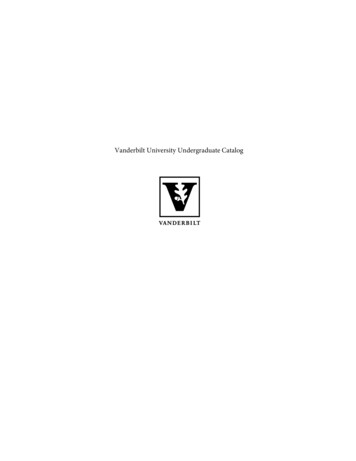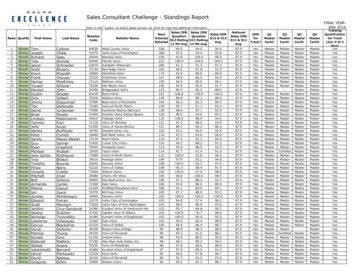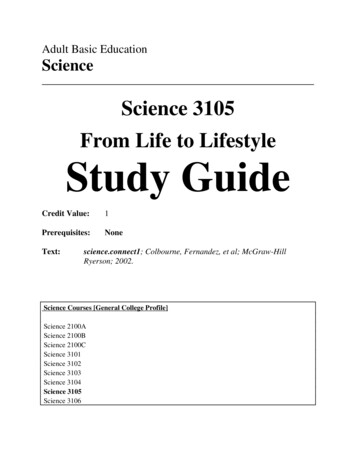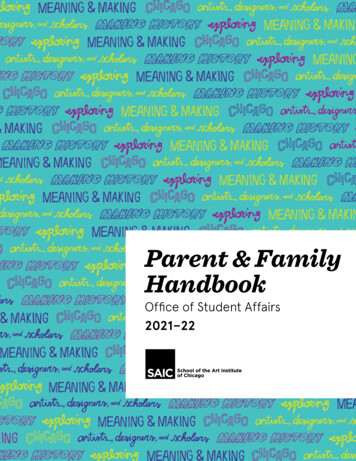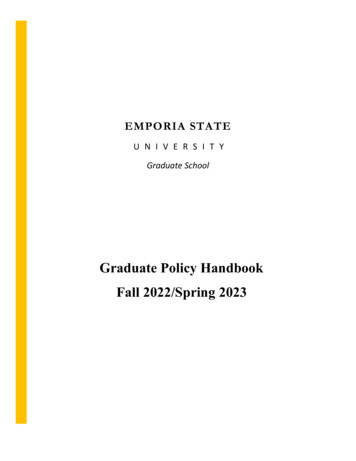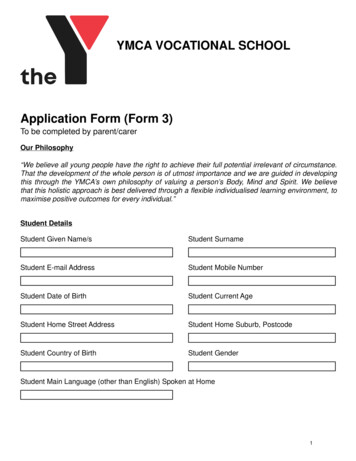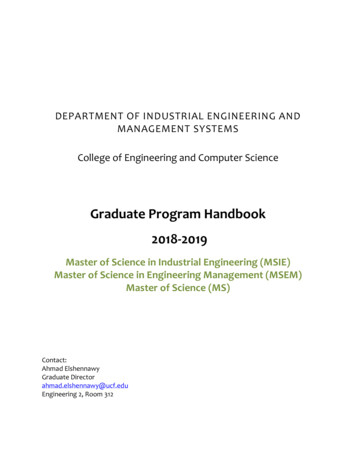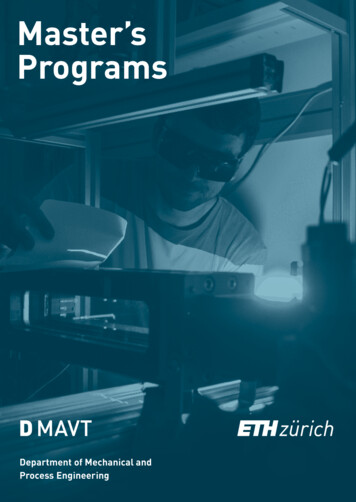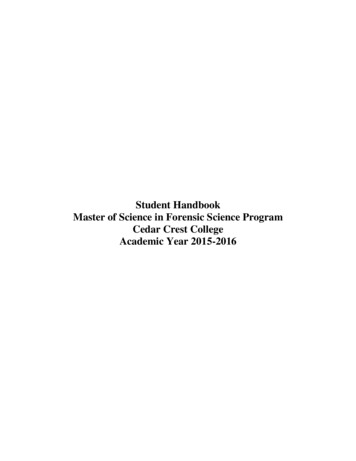
Transcription
Student HandbookMaster of Science in Forensic Science ProgramCedar Crest CollegeAcademic Year 2015-2016
2
PrefaceWelcome to Cedar Crest College. We are pleased that you have chosen Cedar CrestCollege to pursue a Master of Science in Forensic Science. Your acceptance into the programmeans that we believe that you can make a valuable contribution to the program and that youhave the knowledge and skills to succeed.The demand for forensic science services has continued to grow since the advent offorensic DNA testing in the late 1980s. The success of DNA technology in solving cold cases,identifying perpetrators of crime through DNA databases, and overturning wrongful convictions,has galvanized political leaders and criminal justice professionals into supplying the resources forinfrastructure, capital expenditures, and yearly operating costs for maintaining the currentdemand for forensic services. As a result of the impact of forensic DNA testing on the criminaljustice system, other areas of forensic science are beginning to attract interest. Particularly withinthe private sector, new technologies in areas such as biometrics and drug testing are becomingavailable. Although the country has met the challenge of creating better technologies andconstructing new laboratories, there is a shortage of intellectual capital needed to staff forensicscience positions. Properly educated scientists are needed not only to fill new positions but also tofill existing position due to retirement and turnover. As a result of greater scrutiny of forensicscience work by the legal community and the onslaught of accreditation mandates from theprofessional community, a better educated scientist is needed and desired by laboratory staffingpersonnel. The need for better scientists was continually emphasized in the 2009 report from theNational Academy of the Science on strengthening forensic science. We hope that this programwill help meet that need.The goals and objectives of this program can be found on page 6 of this handbook. Thisprogram is not geared toward any one particular discipline in forensic science. Althoughspecialization is the order of the day among forensic science practitioners, the program is taughtfrom a generalist perspective. Given that physical evidence can take an endless array of forms,we strongly believe that a knowledge base in all the requisite forensic science disciplines isimportant for the practitioner. A forensic biologist, for example, should never anticipate thatbiological evidence will be devoid of trace or pattern evidence. In practice, an item of physicalevidence is likely to contain probative information is a variety of forms, whether it is physical,biological or chemical. Furthermore, we believe that there are certain philosophical tenets thatare common to all forensic science disciplines and that forensic science is a separate and uniquescience. We do not subscribe to the idea that forensic science is simply an “applied science”.We believe the program differs from most others of its kind due to the emphasis thisprogram places on research and developing leadership qualities in students. We believe that thereis no better way to develop scientists than by placing research as the foundation for the program.It is also our hope that this program will prepare you not only for a career in forensic science butto inspire you toward leadership positions in the field as well. Given the pertinent role thatForensic Science now plays in the criminal justice system, the development of future leaders isnecessary for the field to continue to fulfill its professional mandate.The program is open to students of either gender and does not discriminate on the basis ofrace, gender, religion, or sexual orientation. Again welcome to Cedar Crest College. We lookforward to having you as a student.3
Table of ContentspageMission StatementPhilosophy of graduate educationProgram mission statementProgram educational goals and objectivesAdministration of programAdmission to programMatriculationRequirements for continued matriculation and completion of programGrades and grade pointsAcceptance of thesisMaximum period of candidacyTransfer credit policyLeaves of absence, course withdrawals, and incompletesRefund policy for course withdrawalReinstatementProgram requirementsCommencementCourse descriptionsAdvisingTuition and feesFinancial aidGraduate assistantshipsProgram resourcesStudent due process – academic mattersStudent complaints – appeal processAllegations of student academic misconductDefinitions of academic misconductCedar Crest College Honor CodePersonal, academic and professional characteristicsHousing facilitiesProfessional organizationsForensic Science Honor Society, Delta Delta EpsilonIntellectual property rightsAppendixPreparation of Master’s ThesisProcedural Guidelines for Graduate Research SeminarsGuidelines for Projection of Seminar PresentationGuidelines for Format of Seminar PresentationGuidelines for Poster PresentationsBy-Laws for Delta Delta EpsilonQualifications for a Career in Forensic 242424242627424545464752
Mission StatementCedar Crest College is a liberal arts college primarily for women dedicated to theeducation of the next generation of leaders. Cedar Crest College prepares students for lifein a global community by educating the whole student at all stages of life and experience.Philosophy of Graduate EducationBuilding upon the college’s tradition of teaching excellence, graduate education atCedar Crest aspires to provide students with the expertise, judgment, vision, andinspiration to participate actively and responsibly within the diverse communities anddynamic knowledge networks wherein their professional lives will unfold. Institutionally,this commitment rests upon four values which serve as the foundation for the college’sphilosophy of graduate education:Scholarship: Graduate programs should ensure that students master the theoreticalperspectives, methodological techniques, and professional practices essential tothe production of knowledge within their disciplines. This includes exposingstudents to an expanded definition of scholarship, which moves beyond thetraditional emphasis upon discovery to include the integration, application anddissemination of knowledge within and across disciplines.Innovation: Graduate programs should ensure that students recognize the role thatcreativity, and the entrepreneurial spirit more generally, plays as a catalyst for theadvancement of knowledge. While programs should acknowledge the value ofrisk-taking as an inherent element of scholarly practice, students also should learnthat professional conduct must be tempered by an ethic of responsibility for thecommunities within which they live, work and learn.Collaboration: Graduate programs should ensure that students understand how therevolution in information technology is profoundly altering the nature ofprofessional practice by empowering epistemic communities from around theworld to respond to issues of local, national and global significance. Programsshould equip students with the communications and technological skills needed tocollaborate within the context of transnational and interdisciplinary networks thatserve as sites for the production, application and dissemination of knowledge.Professionalism: Graduate programs should impress upon students that graduateschool itself is but the prelude to a lifetime of ongoing professional development.Faculty should convey this message by modeling professional practices within thecontext of an active research agenda and other forms of scholarly activity whichcontribute to the production, dissemination and application of knowledge withinand across disciplines. Similarly, the college should demonstrate its commitmentto educational leadership by providing academic programs, faculty, and thegraduate community more generally, with the institutional support needed tosustain high levels of academic achievement in the face of evolving professional,societal, and global standards.5
Program mission statementTo teach and continually emphasize forensic science foundational principles in allaspects of instruction to students who have a solid background in the natural sciences tohelp produce a future generation of competent, credible and ethical forensic scientists.Program educational goals and objectivesAfter completing the Master of Science Program in Forensic Science studentswill:1. Have the necessary theoretical background in all the primary areas ofCriminalistics. These topics include crime scene reconstruction, patternanalysis, microscopy, forensic molecular biology, and forensic chemistry andtoxicology.2. Demonstrate proficiency in laboratory skills necessary for a career inCriminalistics.3. Demonstrate the ability to analyze and interpret scientific data.4. Demonstrate the ability to provide proper scientific expert witness courtroomtestimony.5. Demonstrate professional conduct and the personal characteristics expectedof professionals in the Forensic Science community.6. Demonstrate the ability to be research scientists.7. Demonstrate proficiency in oral and written communication skills.8. Demonstrate knowledge of current policy, legal, and ethical guidelines forprofessional forensic science practice.Administration of the programThe program has a director who in consultation with the full-time faculty whoteach in the program will determine academic policy. Prior to implementation, the Deanof the School of Adult and Graduate Education (SAGE) must approve all academicpolicy decisions.New course proposals must be approved by the Graduate Programs Committee,which will also serve in an advisory capacity to the program.6
Admission to the programRequirements for admission to the program are outlined below:1. B.S. degree in a natural or forensic science (or its equivalent coursework in arelevant field).2. Completion of the GRE General Test.3. Two letters of recommendations from individuals who can attest to thecandidate’s scientific ability.The following coursework is recommended at the undergraduate level:1. Two semesters of general (freshman) chemistry and two semesters of organicchemistry.2. Two semesters of calculus (differential and integral preferred).4. Two semesters of physics.5. Two semesters of general (freshman) biology.The courses listed must be suitable for an undergraduate science curriculum.Students under consideration for admission may be asked to undergo a successfulinterview with members of the forensic science faculty before acceptance into theprogram. Applicants with a minimum GPA of 3.0 have a better chance of being admittedto the program than applicants who do not. Results of the GRE General Test, grade pointaverage, and letters of recommendation will be used as comparative parameters betweencandidates.Although it is recognized that some students may not finish the designed programin the desired two-year time frame, it is not designed to be a part-time program. Studentswishing to enter the program part-time will be considered but must complete the programin the required time frame (see maximum period of candidacy).The Program Director and the program faculty will make all admissionsdecisions.MatriculationAccepted students are matriculated into the program once they have registered forclasses during their first semester of academic study. Any post-baccalaureate studentwishing to register for a program course may do so without matriculating. Onlymatriculated students, however, can file for a degree.Requirements for continued matriculation and completion of programStudents must complete every class with a minimum of a B-. Students whoreceive a grade of C or withdraw from a course are only allowed to repeat the class onetime. If a student does not receive a grade of B- or above the second time that the studenttakes a course, the student will be dropped from the program. Students receiving a grade7
of F in a course taken for the first time will also be dismissed from the program. FSC501, 502, and 599 are exempt from this policy.Grades and grade pointsA 4.0A- 3.7B 3.3B 3.0B- 2.7C 2.0F 0.0W 0.0 (withdrawal)I IncompleteAcceptance of thesisThe thesis component of the program is not completed until all three members ofthe student’s thesis committee approve the final draft of the thesis. This approval is notedby the signatures of each member of the committee on the approval page of the thesis.Once approved, a minimum of three copies of the thesis will be bound (the programdirector is responsible for the binding of the thesis). One bound copy will be sent to thelibrary, one to the primary mentor, and one to the student.Maximum period of candidacyStudents must complete the program in seven academic years beginning from thesemester of matriculation.Transfer credit policyStudents entering the program may transfer up to 6 credits of coursework. Thetransferred coursework, however, must be equivalent to courses listed in the curriculumand must have been completed within ten years of the date of enrollment in the program(the first day of classes of a student’s first academic year). Once matriculated in theprogram, students will not receive any credit for coursework taken at another institution.Non-matriculated students who take program courses at Cedar Crest, may transfer allCedar Crest courses after matriculation. All transfer courses are subject to all policiesoutlined under Requirements for continued matriculation and completion of programLeaves of absence, course withdrawals, and incompletesStudents wishing to take a leave of absence from the program may request to doso in writing to the Program Director. The granting of the requested leave is at thediscretion of the Program Director and pending approval from the Dean of Adult and8
Graduate Education. The time frame associated with a leave of absence is not counted inthe seven years necessary to complete the program.Students wishing to withdraw from a course must do so by the date determined bythe College. It is advised that students consult the graduate catalog to determine whatthis date is for both the fall and spring semesters.Students receiving an incomplete for a course must complete the course in therequired timeframe as determined by the College. Students failing to complete the coursein the required timeframe will receive a grade of F in the course.Refund policy for course withdrawalsPlease consult the graduate catalog for a complete description of the refundpolicy.ReinstatementIf a student has been dismissed from the program for any reason, the student canreapply to the program but must wait one full academic year before doing so (forinstance, a student who was dismissed in academic year 2015-2016 cannot reapply untilacademic year 2017-2018). Students coming back from a leave of absence will bereinstated into the program and will continue at the point where they left off as long asthe time frame is no longer than 3 years.Program requirementsFirst yearYear one of the program will consist of graduate coursework and undergraduateprerequisites (see below) that need to be completed, the writing of a thesis proposal, andthe selection of a thesis committee. The writing of the thesis proposal and the selectionof the thesis committee will occur in the 2-credit Thesis Prospectus course (FSC 500)which is offered during the spring semester. The thesis committee will consist of aprimary mentor and two other individuals. The primary mentor must be a full-timemember of the program faculty and the second reader must be external to the forensicscience program and the Department of Chemical and Physical Sciences. The selectionof the second reader may, for instance, be a faculty member from another department atCedar Crest College, a faculty member from another institution, or a forensic sciencepractitioner. The role of the second reader is to provide the student with technicalguidance in consultation with the primary reader. In most cases, the second reader shouldhave a master’s degree. Individuals with a bachelor’s degree may be considered if theypossess rare or very specialized knowledge and have extensive professional experience.The third reader must be a full-time faculty member from the program faculty and isexpected to provide technical guidance as well. The third reader is also responsible forconducting an administrative review of the thesis. The composition of the thesiscommittee and the topic of the thesis must be approved by the full-time program faculty.9
If a student initiates a change in topic at any point during the research process, thestudent will be required to write a new thesis proposal and form a new thesis committeewhich must be approved by the Director and program faculty.If a primary mentor or a third reader leaves Cedar Crest College, they cancontinue to be a member of the Committee for a period of six months. After six months,the student with the approval of the faculty must select a replacement from the existingfull-time faculty at Cedar Crest College.Undergraduate prerequisites include Biochemistry and Genetics. Studentsaccepted into the program without these courses must register for these courses at theundergraduate level (CHE 307 – Biochemistry; BIO 313 – Mendelian and PopulationGenetics) during the first year.Summer TermStudents will be required to perform the bulk of their master’s thesis researchduring the summer between the first and second year. Research can be performed oncampus or at an external laboratory (requires prior approval from Director and programfaculty). Cedar Crest offers two summer sessions and students will be required toregister for both sessions in the following format:Summer Session IFSC 501Forensic Science Research I (3 credits)Summer Session IIFSC 502Forensic Science Research II (3 credits)During the second year seminar course (FSC 504), each student will be requiredto present a one-hour seminar on the results of their research. However, the seminar willonly be conducted with the approval of the primary mentor. Students requiring additionaltime to prepare for the seminar may do so as long as they do not exceed the requiredtimeframe for completion of the degree. A committee of faculty is responsible forwriting a review of the seminar and providing a grade to the instructor of the seminarcourse. Students will also be required to write a thesis during the second year. Theprogress of the thesis writing will be monitored during the seminar course. Studentsrequiring additional time to complete the thesis may do so as long as they do not exceedthe required timeframe for completion of the degree.The thesis component of the program represents the Capstone experience for theprogram and supports the goals and objectives of the program. Thesis and seminarprocedural and presentation guidelines are given in the Appendix.Second yearIn addition to completing the writing of the thesis, the second year of thecurriculum will consist of completing the remainder of required coursework. Students10
should submit the first draft of their thesis to their primary mentor by February 1. Inorder to guarantee graduation, students must have their full committee sign off on thethesis by April 15. In addition to FSC 501 and FSC 502, students fulfilling curricularrequirements for the degree must complete the following courses.BIO 548FSC 500FSC 503FSC 504FSC 505FSC 506FSC 507FSC 508FSC 509FSC 510FSC 511FSC 512FSC 513FSC 514FSC 515FSC 516Research Design and StatisticsThesis ProspectusProfessional CommunicationSeminarSeparations ChemistryAnalytical SpectroscopyForensic ChemistryForensic Pharmacology andToxicologyAdvanced Crime SceneReconstruction (lab component)Recent Advances in ForensicBiology (lab component)Molecular BiologyForensic Science AdministrationAdvanced Microscopy(lab component)Legal and Ethical Issues inForensic ScienceAdvanced Pattern Analysis(lab component)Forensic Chemistry/Toxicology Lab3 credits2 credits2 credits2 credits2 credits2 credits3 credits3 credits3 credits4 credits3 credits2 credits3 credits2 credits3 credits2 creditsIn addition, students will be required to register for 1 credit of continuing researchunder FSC 599 each semester after the completion of FSC 501 and 502 until thecompletion of the degree (this does not include summer).In addition to research and undergraduate prerequisites, 41 graduate courseworkcredits are needed for completion of the degree.CommencementAs per Book VII of the Cedar Crest College Faculty Handbook, students can onlyparticipate in commencement exercises if their primary mentor and program director areassured that all requirements for the degree will be completed within four months of theceremony date.Course descriptionsBIO 548 Research Design and StatisticsThis course deals with fundamental and advanced concepts in probability, statistical11
methods, and hypothesis testing. Topics include, but are not limited to, fundamentals ofprobability; summary statistics; basic hypothesis testing; analysis of frequency data;analysis of variance; regression and correlation; factor analysis and principal componentsanalysis; discriminant analysis; and other multivariate methods.Nonparametricapproaches will also be covered. Statistical power will be discussed in the context ofresearch design.FSC 500 Thesis ProspectusAn introduction to scholarly and research manuscript writing, forensic science literature,and documentation styles and techniques. Discussion will center on current researchtrends within the forensic science community. Each student will write a thesis proposalby the end of the semester and select a thesis committee.FSC 501 Forensic Science Research IFirst-half of laboratory research in forensic science subject areas. Data generated fromresearch will form the basis of a master’s thesis needed for degree completion.Prerequisites: Completion of FSC 500FSC 502 Forensic Science Research IISecond-half of laboratory research in forensic science subject areas. Data generated fromresearch will form the basis of a master’s thesis needed for degree completion.Prerequisites: Completion of FSC 500 and FSC 501FSC 503 Professional CommunicationThe course discusses all aspects of professional communication, oral and written, andevaluates a student’s ability to effectively communicate in the professional world.Students will participate in mock interviews with professionals.FSC 504 Graduate SeminarA lecture series involving presentations from students on their master’s thesis research in a onehour seminar format. Select presentations from invited speakers.Prerequisites: Completion of FSC 503FSC 505 Separations ChemistryAn advanced study of the various types of separation methods used in chemistry withattention to specific types of applications to forensic evidence and modern methods offorensic chemical analysis. This course will challenge and advance the studentsunderstanding of the analytical separation methods and analyses of forensic science froma fundamental, chemical perspective. Students will learn from a scientific analyticalperspective the theoretical and practical aspects in the concepts of separating analytes inforensic evidence. Topics will be presented to include modern separation methods,12
concepts, and techniques such as sample preparation techniques, extraction methods suchas liquid-liquid, solid-phase, and micro-extraction, precipitation separations, ionexchange separations, electrochemical and gravimetric separation methods, andchromatographic separations such as gas chromatography, liquid chromatography,supercritical fluid and capillary electrophoresis.FSC 506 Analytical SpectroscopyIn this course the student will study various types of modern chemical spectroscopictechniques. From a fundamental, chemical perspective the course will challenge andadvance the student’s understanding of these analytical methods used in forensic science.The focus of study will be the theoretical and practical spectroscopic concepts ofanalyzing forensic evidence. Topics will include molecular spectroscopy, ultravioletspectroscopy, infrared spectroscopy, mass spectrometry (MS), atomic X-Rayspectrometry, inductively coupled plasma (ICP), ICP/MS, Raman spectroscopy, andsurface characterization by spectroscopy.FSC 507 Forensic ChemistryA study of the chemistry of certain types of forensic evidence and modern methods offorensic chemical analysis. This course will challenge and advance the studentsunderstanding of the analytical methods and analyses of forensic science from afundamental, chemical perspective. Students will learn from a scientific analyticalperspective the analysis of materials such as drugs, glass, paints and plastics, fire debris,explosives, fibers and other types of physical evidence. Students will learn the meaningand significance of analytical data from a fundamental approach. Topics will bepresented to include modern reactions, concepts, techniques and instrumentation such aschromatography, infrared spectroscopy, and ultraviolet spectroscopy.FSC 508 Forensic Pharmacology and ToxicologyThe course will introduce students to principles and methods in the areas of forensicpharmacology and toxicology. The course will introduce pharmacological andtoxicological principles as they pertain to commonly encountered abused and toxicsubstances. Discussions will focus on the drugs, their mechanism of action, post-mortemcharacteristics, methods of collection and methods of preservation and analysis. Thecourse will review basic concepts of analytical chemistry as it applies to drug and bodyfluid analyses. Specific methods for the analysis of alcohol, barbiturates,benzodiazepines, opioids, cocaine, marijuana, amphetamines, and hallucinogens will bepresented.Prerequisites: Completion of a biochemistry courseFSC 509 Advanced Crime Scene ReconstructionThere are various analyses that a forensic scientist might perform when reconstructing acrime scene. Each crime scene is different and the circumstances of a particular scenewill suggest the type of analysis that will be needed in a particular case. It is incumbent13
upon the scene investigators, ideally forensic scientists, to make the decisions on how toaddress the physical evidence problems. Defining the scientific problem must be done atthe scene because no amount of laboratory testing can overcome an ineffective sceneexamination. This course will begin with an introduction to basic crime sceneinvestigation methods followed by an in-depth study of specialized techniques such asbloodstain pattern analysis, toolmark analysis and bullet path measurements. Studentswill then use this knowledge in hands-on exercises dealing with these topics includingcrime scene photography and sketching. Laboratory included.FSC 510 Recent Advances in Forensic BiologyAn advanced forensic biology course that will deal primarily with newer techniques usedin body fluid stain identification, DNA extraction, DNA quantitation, PCR, andgenotyping. Emphasis will be placed on state-of-the-art technologies and theirapplication to common forensic biological issues such as degradation, sensitivity,specificity, and variation in sample type. Advanced DNA topics including SNPs,microbial DNA, Y-STRs, mitochondrial DNA, and plant DNA will also be discussed.The course will also focus on population statistics used in forensic DNA analysis with anemphasis on statistical interpretation of mixtures. Laboratory included.Prerequisites: Concurrent with FSC 511 and either completion or concurrent with agenetics courseFSC 511 Molecular BiologyThe course begins with an examination of basic molecular biology including the structureof DNA, methodology of DNA replication, regulation of gene expression, andconsequences of DNA mutations. The use of recombinant DNA and its applications inthe study of human genetics will be explored as well as the impact of biotechnology onsociety.Prerequisites: Concurrent with or completion of a genetics courseFSC 512 Forensic Science AdministrationThis course will focus on the practical application of forensic science laboratorymanagement. Scenarios of actual issues confronted by forensic science laboratorymanagers will be discussed as well as economic and business considerations in theadministration of a forensic science laboratory. Discussion will also include currentissues, prioritizing resource allocation, management of personnel, ethics, forensic sciencelaboratory facilities, building relationships with outside agencies, leadership in a crimelaboratory, and crisis response.FSC 513 Advanced MicroscopyLecture and practical instruction in the theory and forensic application of microscopymethods. This course will focus on light microscopy, polarized light microscopy,fluorescent microscopy, phase contrast microscopy, scanning electron microscopy, andspectroscopic methods that can be interfaced with the microscope (such as micro-FTIR,14
microspectrophotometry and x-ray microanalysis). Additional emphasis will be placed onsample preparation, chemical microscopy, and photomicrography. Laboratory included.FSC 514 Legal and Ethical Issues in the Forensic SciencesThe role that a forensic scientist plays in the litigation process will be discussed. Studentswill learn the appropriate guidelines for professionalism and conduct in expertwitnessing. All students will participate in a moot court exercise. The course will alsoaddress standards of reliability and relevance of scientific evidence in court and thedistinction between good science, bad science and junk science. Legal rules such asdiscovery, quality assurance in forensic science laboratories, and the development andapplication of professional codes of ethics will also be discussed.FSC 515 Advanced Forensic Pattern AnalysisStudy in the comparative analysis of pattern evidence typically encountere
Master of Science in Forensic Science Program Cedar Crest College Academic Year 2015-2016 . 2 . 3 Preface Welcome to Cedar Crest College. We are pleased that you have chosen Cedar Crest . Cedar Crest College is a liberal arts college primarily for women dedicated to the education of the next generation of leaders. Cedar Crest College prepares .
